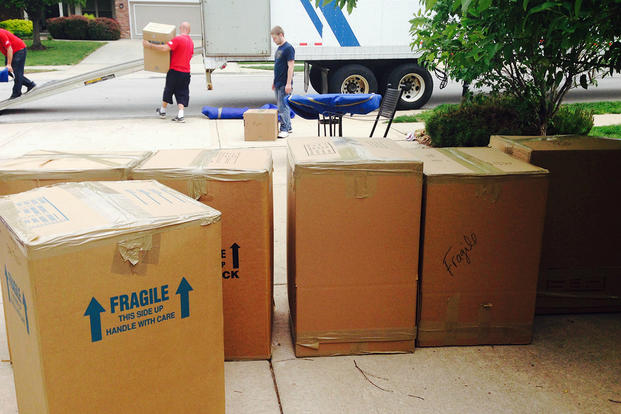Generally, a service member's moving needs will fall into one of the following categories (all topics are grouped in alphabetical order):
BCD/Other
Members separating with other than an Honorable Discharge must obtain a letter from their convening authority authorizing their dependents to be moved.
Continental United States (CONUS)
Any move within the continental United States. This makes up the majority of most relocations, and is usually done by the contract carrier assigned by the government by the member as a Do-It-Yourself (DITY) move, in some areas by Service-member Arranged Move (SAM), or a combination of the above.
Deployment Storage
If deployed with a ship or squadron for 90 days or more, some members (single and geographic bachelors) may be eligible to store household goods at government expense.
Entitlements
Your moving entitlements depend in large measure on your orders and what is written in them.
Home of Record or Combination of Orders Move
This move involves shipment of household goods from a location other than within your current local area, or another area in the continental United States or overseas. It is the most complex move because of the paperwork involved.
Local Move
A door-to-door move within the local area, with no storage involved. Most common are moves into and out of government quarters.
Overseas Duty Orders
- Shipment of household goods upon receipt of PCS orders. Must have 12 months or more remaining after the scheduled arrival of household goods.
- An unaccompanied baggage shipment.
- Long-term storage (non-temporary) for the length of the tour.
- Shipment of household goods and/or unaccompanied baggage to a specified or designated location in the continental United States.
- Shipment of a privately owned vehicle, if permitted. Some overseas areas restrict shipment of privately owned vehicles. If moving overseas, the personal property counselor will review these restrictions with the member, depending on the member's destination.
- Dependent entry approval is required for some overseas locations. Contact your local PPSO for more information.
Overseas Move
A move from the continental United States to an overseas location, including Alaska and Hawaii, is considered an overseas moves. Family member entry approval is required for some locations.
Permanent Change of Station Orders (PCS)
- Shipment of household goods from the current duty station to the new duty station.
- An unaccompanied baggage shipment.
- Transfer of goods from long-term storage (non-temporary) to the new duty station.
Personally Procured Move (PPM)
Formerly the Do-it-Yourself (DITY) move, servicemembers can move their household goods and personal property on their own and get reimbursed in this program. You can be reimbursed up to 100% of the Government Constructive Cost (GCC) if you hire your own carrier, or an incentive payment of 95% of the GCC if you move the property on your own. An advance allowance can be authorized to defray out-of-pocket moving expenses.
Retiring from Service
Members retiring from the service have one year to complete their final move. If members have not made their home of selection, they are entitled to storage for one year at "origin" from date of retirement. If members have less than 18 years of service as of November 1, 1981, their goods may be shipped anywhere within the United States, including Alaska and Hawaii. Members on retirement orders may request extensions beyond the one year limit for medical, training, educational or other deserving reasons.
When requesting extension of shipment rights, you should contact the nearest moving in person or by mail. You will need your Retirement orders (with accounting data), your DD-214, documentation from school verifying commencement and/or a letter from your doctor showing your hospitalization or treatment, and a letter from service member requesting extension.
Non-temporary storage beyond one year from effective date may be excess cost to you but at the government rate. Note: You could be liable for all transportation costs arising from making more than one shipment.
Sea Duty Orders
- Shipment of household goods to the new homeport.
- An unaccompanied baggage shipment.
- Placement of goods in long-term storage (non-temporary) for the length of the tour, or continuation of non-temporary storage.
- Transfer of goods from long-term storage (non-temporary) to the new duty station.
Separating from Service
Members separating from the service on a Voluntary Separation with Incentive (VSI) or a Special Separation Bonus (SSB) have the same entitlements as retirees. Members separating on the transition management program (TAMP) or separating involuntarily between have the same entitlements as retirees.
Separation Orders
Members separating from the service have 180 days from the effective date of discharge to move personal property at government expense. If unsure of where they want to move, local storage of up to 180 days may be requested.
Members living in government quarters and separating or retiring, may move locally out of the quarters (Local Move) and still have their shipping rights within the authorized time limit.
Unusual or Arduous Sea Duty Orders
- Same as sea duty orders. But, in addition, make shipment of household goods and /or unaccompanied baggage to a specified or designated location within the continental United States.
Keep Up-to-Date for Your Next PCS
Get the inside information from those who know. Get PCS help and all the news and benefits information you need delivered straight to your inbox. Subscribe to Military.com now.













